- Home
- J. T. Edson
Rockabye County 5 Page 4
Rockabye County 5 Read online
Page 4
‘Go to it. I’ll handle things this end. Over and out.’ Returning to Cen-Con’s frequency, Alice reported that Unit S.O. 12 could once again be contacted, and then sat back to await further developments. While Brad drove, Alice relaxed and ignored the sight of buildings and people slipping away behind the car.
In her mind she could almost see the wheels beginning to turn. At the Department of Motor Vehicles, clerks would be checking their records to locate the license number of Covacs’ car. The staff of the Records and Identification Bureau probably had already searched for any information they might have on the wanted man. If he proved to be on record, details of it, along with his description, would be passed out to the various Sheriff’s Sub-offices dotted about the county, also to the Highway Patrol, municipal police departments and sheriffs’ offices in the surrounding counties. In the event that Covacs had run South and crossed the border into Mexico, he must use a bridge, all of which had a staff of Border Patrol and Customs officials in attendance and these too would be informed. Below the border, the local Mexican authorities worked in close cooperation with the Rockabye County Sheriff’s Office and were likely to be aware of Covacs’ presence in their country, in which case they would contact Cen-Con with the news.
Should Covacs prove to be clean in Rockabye County, the Identification and Criminal Records Division of the Texas Department of Public Safety at Austin’s State-wide coverage might furnish information. If that failed, Covacs being an immigrant, the Federal Bureau of Investigation were sure to have his fingerprints and mug-shots on their vast country-covering files.
In the old days, a fleeing criminal might be chased by a mounted posse, but once clear of the county could count himself reasonably safe. With only the slow U.S. mails, or the inadequate facilities offered by telegraph, spreading word of a wanted man was a slow, laborious business. The Rockabye County Sheriff’s Office now used radio, teleprinters and the Speed-Photo service as aids in the hunt for wanted men.
Being the only real lead to the shooting attempt, Covacs could be of the greatest assistance, so he must be located and, if possible, brought back to Gusher City for questioning. The mystery of the man seen by Grantley and Melnick entering Pete’s Bar acted as hinge to the whole case. If he had been an innocent citizen passing through, Covacs would not have run; which meant that Grantley’s guess must be right and he had seen Mikos Papas. Carried further, the information meant that the whole Colismides bunch could be in Rockabye County.
Alice did not discount the possibility of the gang having arrived. With a population of over two hundred thousand, Gusher City could absorb unnoticed eight men, even though their faces had been shown over the television networks and in newspapers since their escape. All around the city lay the one hundred miles length and ninety miles width of the county. Of course not every part would be suitable for the gang’s use, but a vast area remained in which they could find a safe refuge. They might be on some back-country ranch posing as cowhands, or in a hunter’s cabin dressed and acting like visiting sportsmen.
Should the gang be in Rockabye County, Alice knew enough about Sheriff Jack Tragg to feel certain that he would make every effort to ensure it did not escape again. Knowing the consequences of going to arrest such a desperate bunch, Alice hoped that evidence proved some person other than a member of the Colismides gang had organized and made the abortive attempt on Vera Grantley’s life.
Six
The gunmen’s car had been located on a vacant lot in the factory district of Gusher City South, not a mile from the scene of the shooting. Reaching the street named by the dispatcher, Brad swung the Oldsmobile on to it, passing between the high walls and fences of the factories. There was no need to puzzle over exactly where to stop. Two R.P. cars, an ambulance and two black Detective Bureau cars were parked almost bumper to bumper before the vacant lot which separated a plastics manufacturing company from a large footwear factory. On the sidewalk, a couple of patrolmen held back the usual collection of onlookers, men and women from the surrounding factories, kibitzing during their coffee-break.
After identifying themselves to the patrolmen, Alice and Brad entered the vacant lot. Its center sloped down to form a large basin, at the bottom of which rested the gray Rambler. Three detectives and a medical examiner’s crew stood in two loose groups and watched a police photographer at his work.
Even as the deputies approached, the photographer turned from the car and walked to the detectives. He offered one of them a sheaf of Land Polaroid photographs and walked away with the air of having just completed an unpleasant task.
Drawing on a pair of rubber gloves, the white-coated medical examiner went to the car. He had handled such work before and took care not to touch any surface where he might smear an incriminating fingerprint.
‘I’m Jameson,’ introduced one of the detectives, glancing at the deputies’ I.D. wallets, and indicated the second. ‘This’s McDougal. Gusher City South.’
Only two of the detectives worked out of the Gusher City South station house, the third Alice and Brad knew to be a member of the Latent Prints Detail of S.I.B.
‘Fayde and Counter,’ Alice replied conventionally. ‘Sheriff’s Office.’
‘Hi!’ Brad said. ‘This’s our car all right.’
McDougal, a bulky Negro, offered Alice the photographs. While each of the city’s police divisions had its own detective squad, the Sheriff’s Office—having county-wide jurisdiction—served the function of a homicide investigation section for all the local law enforcement departments.
‘Then you sure made a mess of it, for shame,’ the Negro, remarked. ‘Are they the pair who buzzed Ian Grantley’s wife?’
‘Sure,’ agreed Alice. ‘Did you say two?’
‘I counted them on my fingers.’
‘You reckoned you’d only hit one, Brad.’
‘I thought I might have nicked the hombre in the front seat.’
‘If that’s what you-all call a nick,’ drawled the medium-sized, stocky white detective, ‘I’d hate like hell to see your idea of a serious wound.’
Leaving Alice and Jameson to study the scene-of-crime photographs, Brad and McDougal walked towards the car. They had no need to worry about tramping on and spoiling footprints, for the ground was iron hard.
The M.E. had finished in the rear of the car and reached through the front window to ease aside the second body so he could open the door. Not wishing to disturb the M.E. at his work, Brad and the Negro moved around so that they could look into the rear.
Seen from that angle, the man in the rear seat did not look too bad. The black nylon stocking used as a mask had absorbed most of the blood from the hole between his eyes. He lay sprawled at the right side of the car, having been thrown there by the impact of Brad’s powerful hand-loaded bullet. Broken open for reloading, a sawed-off shotgun rested against the seat and two empty cases lay on the floor.
Coming in from the front, Brad’s bullet had burst—and no other term could adequately describe the result—out at the back, spraying blood, brains and slivers of bone over the rear window, roof and side of the car. It was not a pretty sight.
‘Somebody sure wanted this joker dead,’ remarked the M.E., indicating the body in the front seat. ‘He was hit twice; the first time some minutes before the second. First bullet caught him under the ribs and I’d say it had come through the car door.’
‘Could he have walked with it in him?’ asked Brad.
‘Not far, although he might have lived if he’d received medical aid soon enough.’
‘And the other wound?’ Brad continued, wondering if his final shot had struck home on the man already hit.
‘I’d say it was fired by the driver, as the victim turned to open the door,’ replied the M.E. ‘Bullet entered from behind and there’re extensive powder burns around the wound.’
‘Wouldn’t want to take the masks off so that we can look them over, would you, doc?’ asked McDougal.
‘No— But I’ll have to,’ t
he other growled. ‘Let’s have them out of here first.’
While waiting for the removal of the bodies, Brad glanced at McDougal and wondered what the other thought of him. Racial antipathy did not enter into the matter. Brad would have acted the same way no matter what color, race or creed had sired the other man. Unlike the other members of the Sheriff’s Office, Brad had come straight into Jack Tragg’s staff without first receiving a grounding of Police Academy, Patrol Bureau and Detective Squad on the municipal police. A Police Science and Administration graduate from the University of Southern Texas, Brad increased his knowledge by attending, at his own expense, the F.B.I.’s exacting twelve-week police training course and also the seven day seminar at the Pasadena, California, Institute for Police Marksmanship Instructors. On each occasion he came through with top grades and Jack Tragg accepted him as a deputy. Such a decision did not come easily, but the hard grind of duty tried Brad without finding him wanting.
At first other peace officers tended to regard Brad’s appointment as a whim, a favor for rich, influential parentage. Then he helped the sheriff break up a gang running wet-backs, illegal immigrants, in from Mexico and trapped a mighty smart smuggler. v The final seal of his acceptance came with the hunt for Tom Cord’s killers and the death at Brad’s hand of the two professional gunmen who shot the deputy down.
Nowadays, when on a case, Brad found detectives and patrolmen inclined to regard him as a senior consultant, rather than a playboy interloper who worked as deputy for kicks.
Working with a pair of scissors, the M.E. removed the mask from the man in the front seat. Having been struck behind the skull, the emerging bullet had torn the face so badly that identifying it was next to impossible.
‘Ed!’ called McDougal, looking down at the almost untouched face of the man from the rear seat. ‘Just take a look who we’ve got here.’
‘Frankie Angers, as I live and breathe,’ Jameson ejaculated as he studied the dead face. ‘Some damned informers we’ve got; him back in town and not so much as a whisper from any of them.’
‘He didn’t stay long,’ commented McDougal. ‘Our house owes you a vote of thanks, Brad. He burned down a policewoman and wounded two harness bulls three years back, before he jumped town. I don’t make the other one.’
‘Latent Prints probably will,’ Alice said. ‘Go through their pockets, Brad.’
Making the inevitable comments about people who pulled rank and made their underlings do all the dirty work, Brad and the Negro searched the bodies. Both wore cheap off-the-peg suits with no identifying marks, shirts which could have come from any five-and-ten store and inexpensive, untraceable gloves. Snub-nosed revolvers rode in waistband holsters and each man’s wallet contained five hundred dollars in old fives and tens. Angers had been a tall, burly, blond man of Nordic extraction. The other man was shorter, slim, with the general skin pigmentation of a Mexican, or other Latin national.
‘I’d say they were professionals,’ commented Alice. ‘Nothing on them to lead us to the other if we nailed one.’
‘What’s behind that hit at Vera Grantley, Alice?’ asked Jameson.
‘I’m not sure. We thought it might be the Colismides mob, but neither of this pair look Greek to me.’
‘Couldn’t say about John Doe there,’ grunted Jameson, nodding to the unidentified body. ‘But Angers’s no Greek. Not that he wouldn’t work for one if the money was right. And from the look of the wallet, it was.’
‘Who found the heap?’ Brad inquired.
‘A rookie harness bull,’ McDougal explained. ‘He picked up the alert and must have prowled every alley and vacant lot on his beat. That’s the joy of youth, you still have ambition and pride in your work.’
Alice turned a resigned face to Jameson. ‘I’ve a philosopher for a partner, Ed. And you’ve a disillusioned cynic.’
‘I’d say let’s team up, but my wife’d never believe it was in the interests of law and order.’
‘All right, all ready,’ put in the man from Latent Prints, advancing. ‘Let the crime-solvers through.’
‘Pass through, Sherlock,’ Alice said. ‘There are two grains of tobacco by the car. From them, I expect to know everything about the smoker.’
‘The difficult we do at once, miracles may take a day or two, the impossible all of a week—if we work Sundays,’ answered the technician. ‘Which is the motto of all good and true members of the S.I.B.’
‘Our’s is Semper in Excretum,’ Brad informed him, but we don’t go around boasting about it.’
Callous as it may seem to an outsider, the banter which passed among the investigating officers had a definite use. Peace officers are human, possessing stomachs which turn cold and revolt at the sight of oozing blood, splintered fragments of bone, lacerated flesh and splattered brains. People in other walks of life can steer clear of death and avoid seeing such horrors. That does not apply when signing and taking the oath of a peace officer. Death forms part of his, or her, daily routine; but familiarity with it does not, in this case, breed contempt.
So the banter helped, forming a kind of defense mechanism which prevented an officer from going to one side, fetching up his, or her, guts, then returning home and writing out a letter of resignation.
‘And while Sherlock looks for clues,’ Alice said, ‘we lesser lights will go our humble way. Mac, you and Ed make the rounds of the factories and ask if anybody saw the car arrive, or anybody leaving the lot around the time it ought to have reached here.’
‘Yo!’ replied the Negro, giving the old-time cavalry response, and threw a glance in Brad’s direction.
The big blond deputy turned abruptly and walked across to the wall of the basin. Turning, he looked back at the front window of the car, changed his position slightly and began to search the slope. It did not take him many seconds to find what he sought. With the aid of a knife taken from his jacket pocket, Brad began to scrape away at the earth where a small hole had attracted his attention. He eased a battered piece of metal from his excavation and turned to face the others.
‘I found the bullet,’ he said. ‘It’s too battered for comparison purposes, though.’
‘We’ll still send it in,’ Alice replied, taking an envelope from her bag and offering it to her partner. Then she glanced at the Latent Prints man. ‘Anything?’
‘I’ve an idea that I’m wasting my time, talents and the tax-payers’ dusting powder,’ he replied. ‘These guys were professionals and that kind don’t leave any prints.’
Before placing the bullet into the envelope, Brad wrote down details of its place of origin. Then he dropped the lead inside and sealed down the flap.
‘Drop this in F.I.L. for me, Mort,’ he said to the technician. ‘There ought to be another sawed-off up front.’
‘No sign of one,’ replied the man from Latent Prints. ‘The killer must’ve took it with him. Say though, whoever picked this place must have been either lucky or knew the area. The car might have been here for hours before somebody found it.’
‘Trust Frankie Angers to know where to dump a hot car,’ Jameson remarked. ‘He always planned his get-aways real good.’
‘Only Angers was dead,’ Brad pointed out.
‘So he’d planned the route before they went to make the hit,’ Mort drawled.
‘You could be right at that,’ Alice grudgingly admitted. ‘S.I.B. mostly are.’
‘You haven’t found a cure for the common cold yet.’
‘Give us time. We’ve only been working on it for six days.’
‘Say though,’ interrupted McDougal. ‘Angers used to shack up with a dame called Moira Bird in the old days.’
‘Where’s she live?’ asked Alice.
‘I couldn’t say which cell, but she’s in the Goree Unit. vi V. and G. caught her with a briefcase full of heroin and Miss Bird flew into a cage.’
‘I thought it wouldn’t be that easy,’ Brad grunted.
‘They never are,’ Alice reminded him. ‘Let’s take a prowl, Brad
.’
‘Funny,’ Brad replied. ‘I could just stand a drink of tea.’
Seven
Although the sign over the door read ‘YE OLDE ENGLISHE TEA SHOPPE’, the interior looked little different from any other small, undistinguished bar and grill in the city. Of course the big brass tea-urn upon the counter could not be duplicated in Texas, but it was only a prop and no customer had ever received liquid refreshment from it.
English Herb, proprietor of the Tea Shoppe, nodded casually to Brad and Alice as they entered, but did no more than take their order, since he had a customer seated at the counter. Small, thin, English had sharp features and tended to be a snappy dresser of the louder variety, going in for striped suits, colored shirts and clashing bow-ties. As he did not wear his jacket at the counter, English today welcomed trade in the full glory of a salmon pink shirt, purple bow-tie and highly colored armbands.
‘It’s a perishing liberty,’ he told the deputies, after serving them, and both could have mimed the familiar speech. ‘Bleeding anti-British, that’s what them racetrack judges are.’
It had long been English’s theory, which he invariably proceeded to explain at great length, that racetrack judges held a grudge against him, kept tabs on all bets he made and used the information to call close things against his horse. To hear English talk, on the rare occasion when he hit a winner, the bookie either absconded, or paid off at well below the quoted track odds. It was such a tale of woe that Alice could not help inquiring why he troubled to continue betting.
‘Blimey, miss,’ English answered in all seriousness. ‘A man’s got to have a bit of fun out of life.’
At that moment the customer rose and walked from the room. Glancing around to make sure they had the place to themselves, Brad said, ‘Frankie Angers, English.’

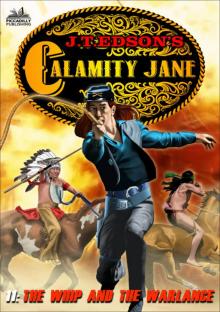 Calamity Jane 11
Calamity Jane 11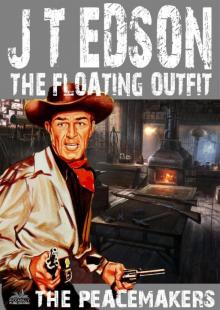 The Floating Outift 33
The Floating Outift 33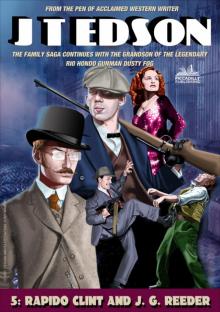 Cap Fog 5
Cap Fog 5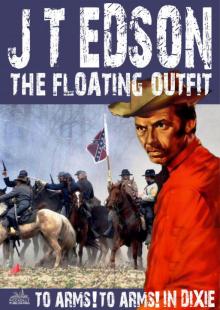 The Floating Outfit 34
The Floating Outfit 34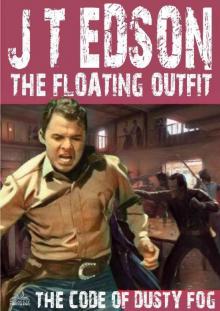 The Code of Dusty Fog
The Code of Dusty Fog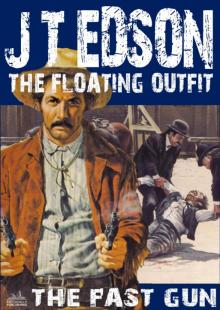 The Floating Outfit 21
The Floating Outfit 21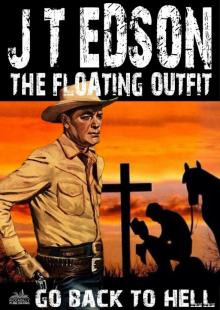 The Floating Outift 36
The Floating Outift 36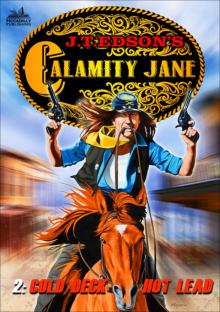 Calamity Jane 2
Calamity Jane 2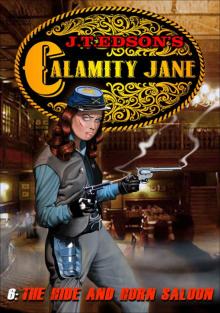 Calamity Jane 6: The Hide and Horn Saloon (A Calamity Jane Western)
Calamity Jane 6: The Hide and Horn Saloon (A Calamity Jane Western)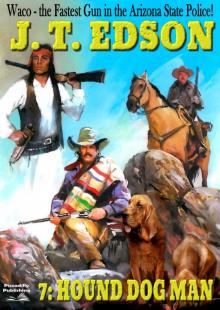 Waco 7
Waco 7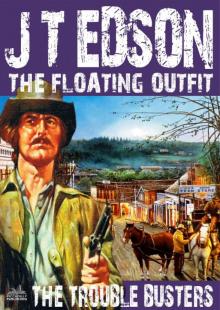 The Floating Outfit 25
The Floating Outfit 25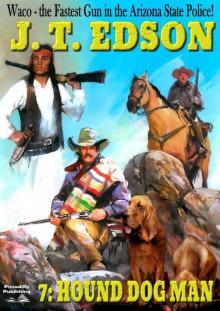 Waco 7: Hound Dog Man (A Waco Western)
Waco 7: Hound Dog Man (A Waco Western)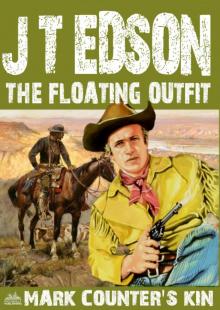 The Floating Outfit 47
The Floating Outfit 47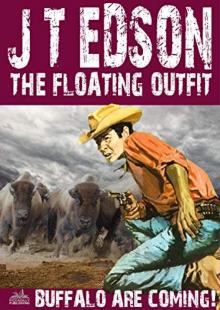 The Floating Outfit 42: Buffalo Are Coming!
The Floating Outfit 42: Buffalo Are Coming!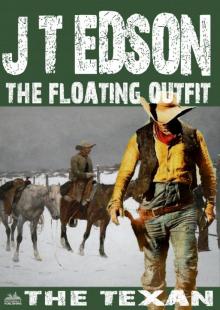 The Floating Outfit 46
The Floating Outfit 46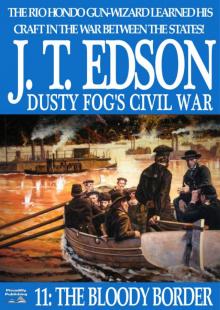 Dusty Fog's Civil War 11
Dusty Fog's Civil War 11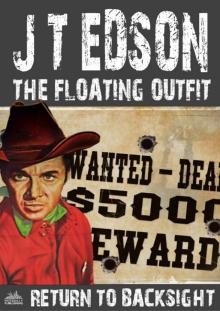 The Floating Outfit 61
The Floating Outfit 61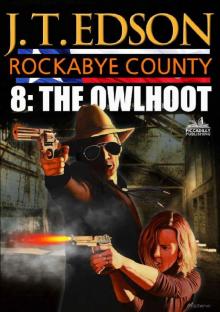 The Owlhoot
The Owlhoot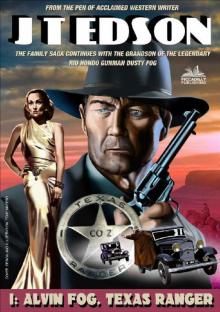 Alvin Fog, Texas Ranger
Alvin Fog, Texas Ranger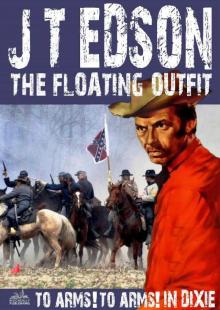 The Floating Outfit 34: To Arms! To Arms! In Dixie! (A Floating Outfit Western)
The Floating Outfit 34: To Arms! To Arms! In Dixie! (A Floating Outfit Western)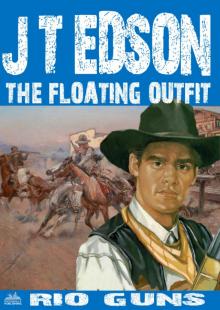 The Floating Outfit 44
The Floating Outfit 44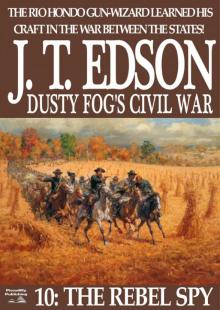 Dusty Fog's Civil War 10
Dusty Fog's Civil War 10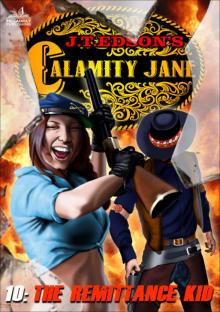 Calamity Jane 10
Calamity Jane 10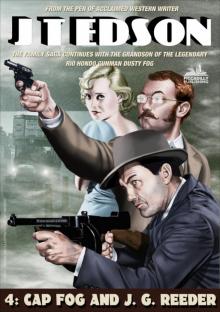 Cap Fog 4
Cap Fog 4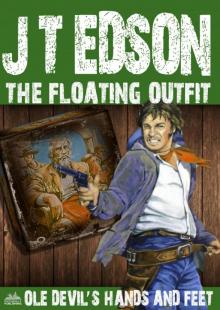 The Floating Outfit 51
The Floating Outfit 51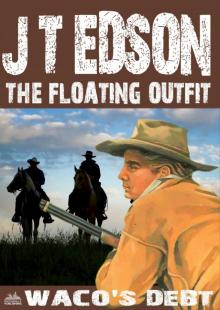 The Floating Outfit 50
The Floating Outfit 50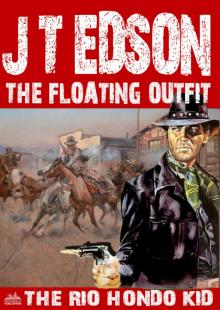 The Floating Outfit 49
The Floating Outfit 49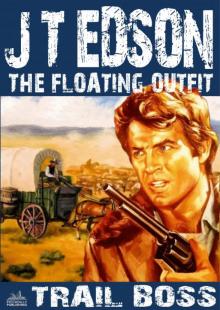 The Floating Outfit 10
The Floating Outfit 10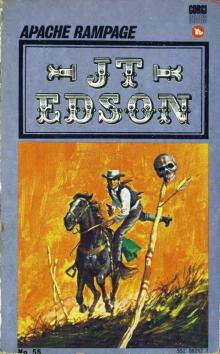 Apache Rampage
Apache Rampage The Floating Outfit 15
The Floating Outfit 15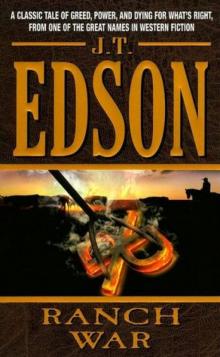 Ranch War
Ranch War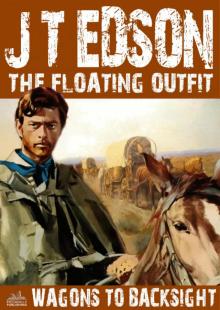 The Floating Outfit 11
The Floating Outfit 11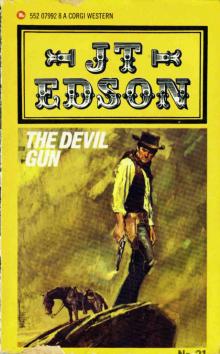 The Devil Gun
The Devil Gun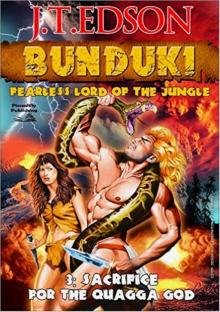 Sacrifice for the Quagga God (A Bunduki Jungle Adventure Book 3)
Sacrifice for the Quagga God (A Bunduki Jungle Adventure Book 3)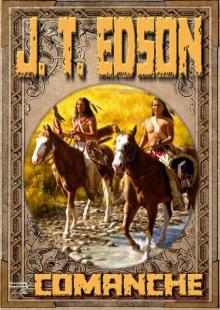 Comanche (A J.T. Edson Western Book 1)
Comanche (A J.T. Edson Western Book 1)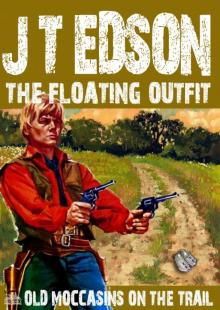 The Floating Outfit 48
The Floating Outfit 48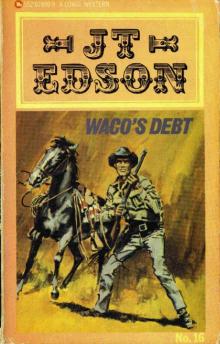 Wacos Debt
Wacos Debt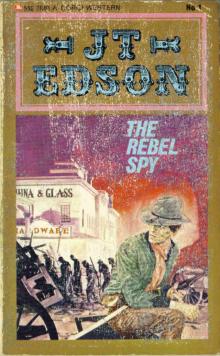 The Rebel Spy
The Rebel Spy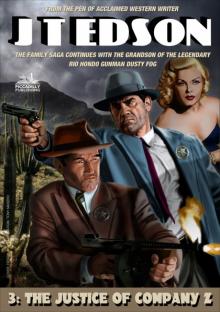 Cap Fog 3
Cap Fog 3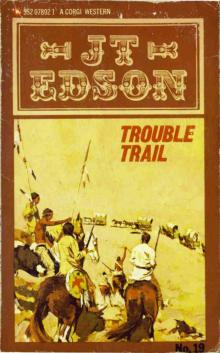 Trouble Trail
Trouble Trail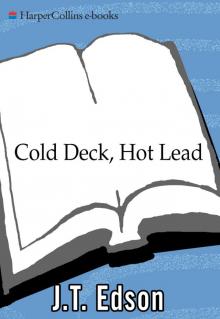 Cold Deck, Hot Lead
Cold Deck, Hot Lead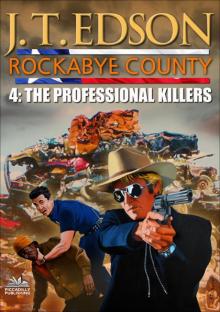 Rockabye County 4
Rockabye County 4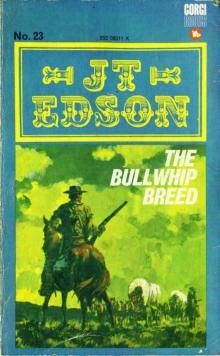 The Bullwhip Breed
The Bullwhip Breed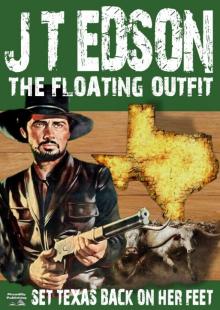 Set Texas Back On Her Feet (A Floating Outfit Western Book 6)
Set Texas Back On Her Feet (A Floating Outfit Western Book 6)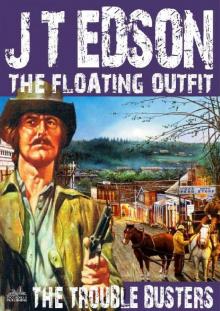 The Floating Outfit 25: The Trouble Busters (A Floating Outfit Western)
The Floating Outfit 25: The Trouble Busters (A Floating Outfit Western) Fearless Master of the Jungle (A Bunduki Jungle Adventure
Fearless Master of the Jungle (A Bunduki Jungle Adventure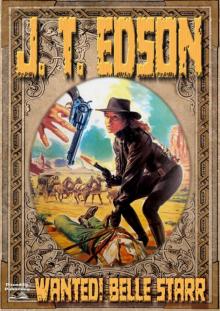 Wanted! Belle Starr!
Wanted! Belle Starr!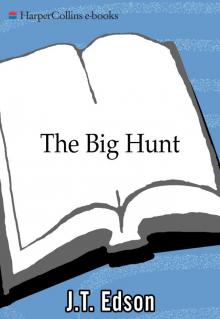 The Big Hunt
The Big Hunt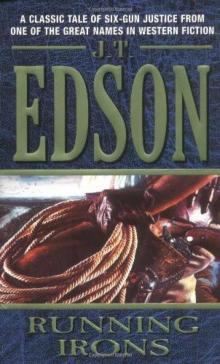 Running Irons
Running Irons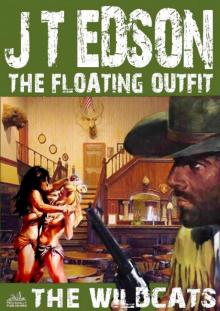 The Floating Outfit 19
The Floating Outfit 19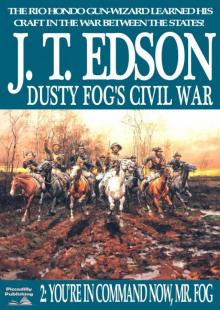 You're in Command Now, Mr Fog
You're in Command Now, Mr Fog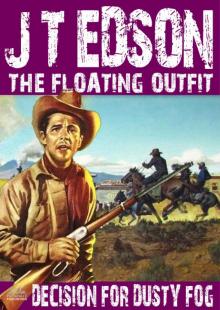 The Floating Outfit 27
The Floating Outfit 27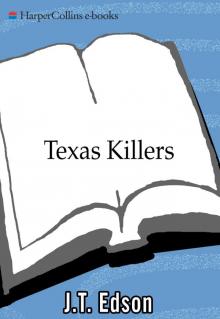 Texas Killers
Texas Killers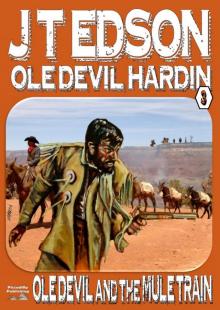 Ole Devil and the Mule Train (An Ole Devil Western Book 3)
Ole Devil and the Mule Train (An Ole Devil Western Book 3)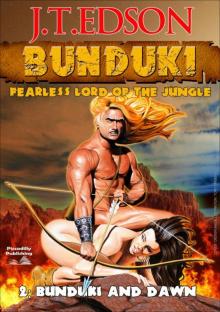 Bunduki and Dawn (A Bunduki Jungle Adventure Book 2)
Bunduki and Dawn (A Bunduki Jungle Adventure Book 2)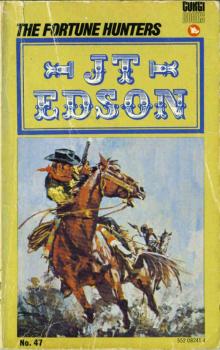 The Fortune Hunters
The Fortune Hunters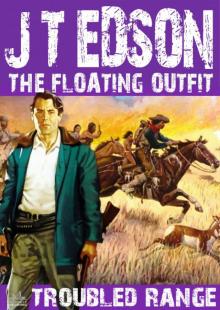 The Floating Outfit 12
The Floating Outfit 12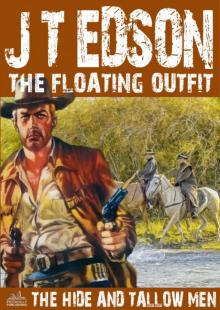 The Hide and Tallow Men (A Floating Outfit Western. Book 7)
The Hide and Tallow Men (A Floating Outfit Western. Book 7)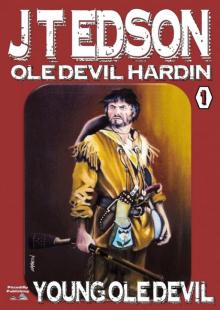 Young Ole Devil
Young Ole Devil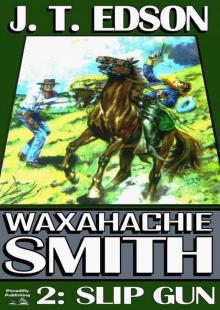 Slip Gun
Slip Gun The Drifter
The Drifter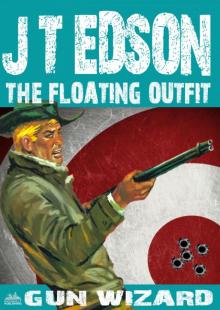 The Floating Outfit 45
The Floating Outfit 45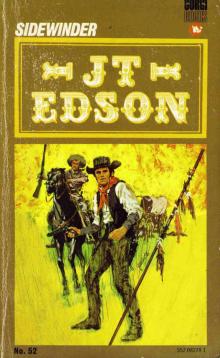 Sidewinder
Sidewinder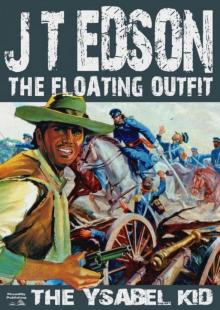 The Ysabel Kid
The Ysabel Kid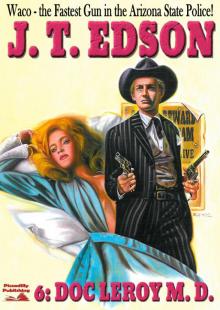 Waco 6
Waco 6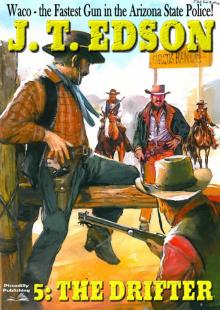 Waco 5
Waco 5 Point of Contact
Point of Contact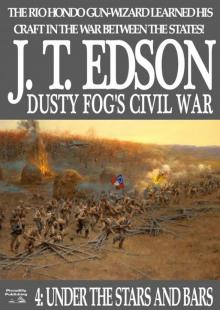 Under the Stars and Bars (A Dusty Fog Civil War Western Book 4)
Under the Stars and Bars (A Dusty Fog Civil War Western Book 4)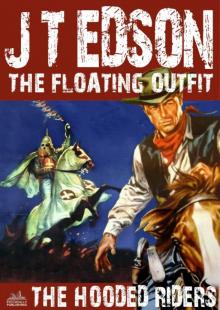 The Floating Outfit 9
The Floating Outfit 9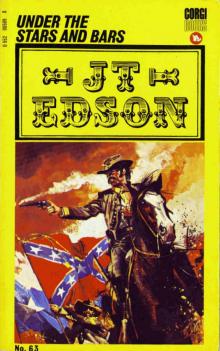 Under the Stars and Bars
Under the Stars and Bars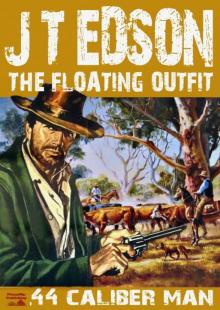 .44 Caliber Man
.44 Caliber Man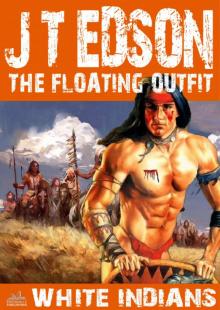 The Floating Outfit 17
The Floating Outfit 17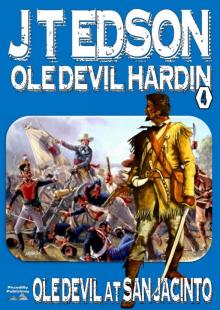 Ole Devil at San Jacinto (Old Devil Hardin Western Book 4)
Ole Devil at San Jacinto (Old Devil Hardin Western Book 4)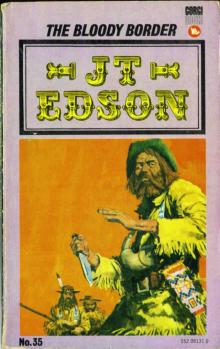 The Bloody Border
The Bloody Border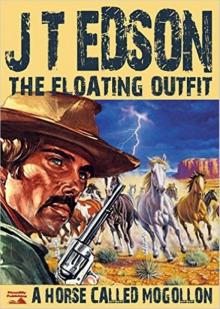 A Horse Called Mogollon (Floating Outfit Book 3)
A Horse Called Mogollon (Floating Outfit Book 3)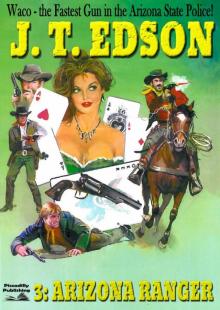 Waco 3
Waco 3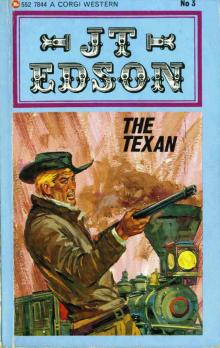 The Texan
The Texan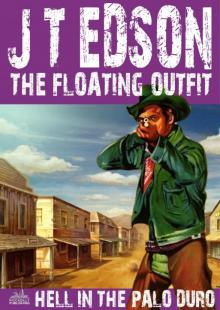 The Floating Outfit 35
The Floating Outfit 35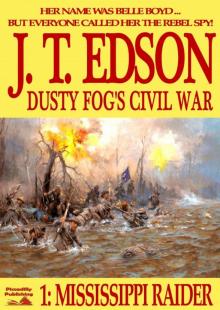 Mississippi Raider
Mississippi Raider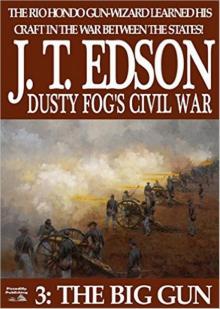 The Big Gun (Dusty Fog's Civil War Book 3)
The Big Gun (Dusty Fog's Civil War Book 3)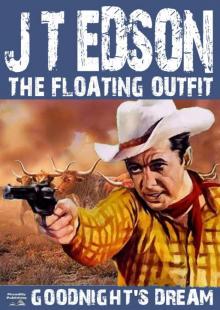 Goodnight's Dream (A Floating Outfit Western Book 4)
Goodnight's Dream (A Floating Outfit Western Book 4) Waco 4
Waco 4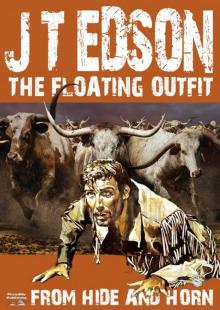 From Hide and Horn (A Floating Outfit Book Number 5)
From Hide and Horn (A Floating Outfit Book Number 5)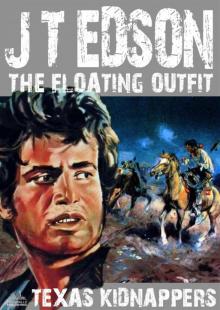 The Floating Outfit 18
The Floating Outfit 18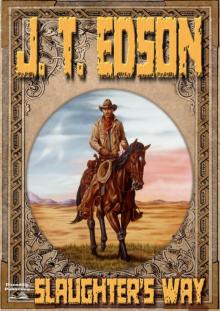 Slaughter's Way (A J.T. Edson Western)
Slaughter's Way (A J.T. Edson Western)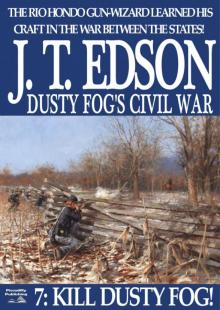 Dusty Fog's Civil War 7
Dusty Fog's Civil War 7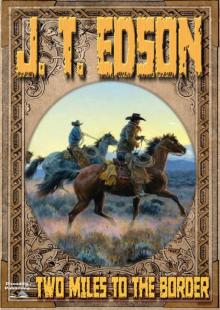 Two Miles to the Border (A J.T. Edson Western)
Two Miles to the Border (A J.T. Edson Western)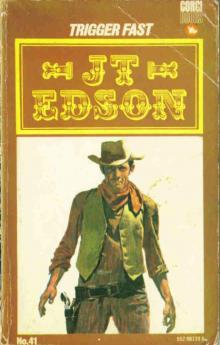 Trigger Fast
Trigger Fast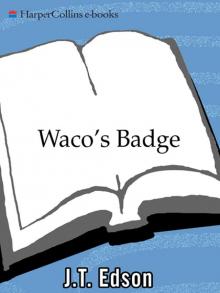 Waco's Badge
Waco's Badge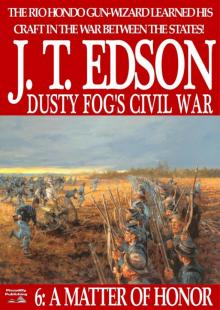 A Matter of Honor (Dusty Fog Civil War Book 6)
A Matter of Honor (Dusty Fog Civil War Book 6)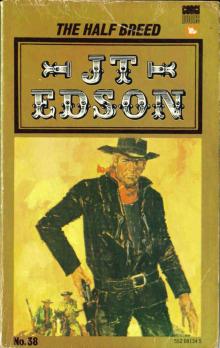 The Half Breed
The Half Breed Bunduki (Bunduki Series Book One)
Bunduki (Bunduki Series Book One)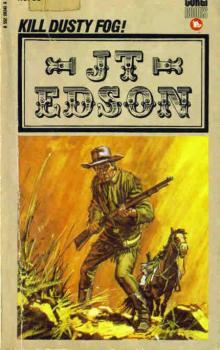 Kill Dusty Fog
Kill Dusty Fog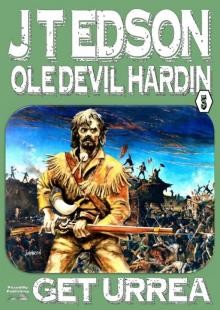 Get Urrea! (An Ole Devil Hardin Western Book 5)
Get Urrea! (An Ole Devil Hardin Western Book 5)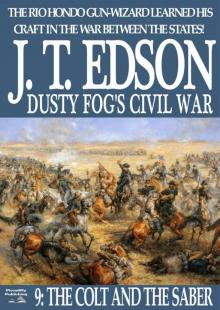 Dusty Fog's Civil War 9
Dusty Fog's Civil War 9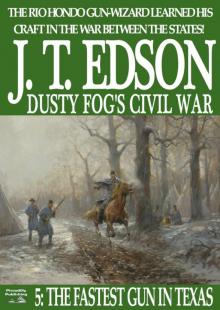 The Fastest Gun in Texas (A Dusty Fog Civil War Book 5)
The Fastest Gun in Texas (A Dusty Fog Civil War Book 5)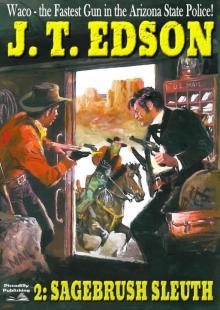 Sagebrush Sleuth (A Waco Western #2)
Sagebrush Sleuth (A Waco Western #2)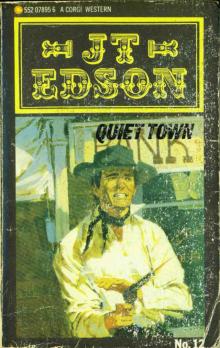 Quiet Town
Quiet Town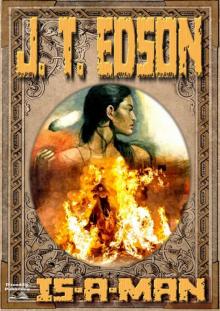 Is-A-Man (A J.T. Edson Standalone Western)
Is-A-Man (A J.T. Edson Standalone Western)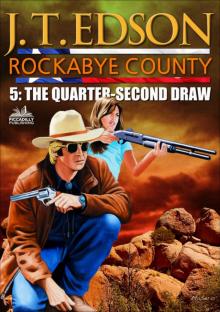 Rockabye County 5
Rockabye County 5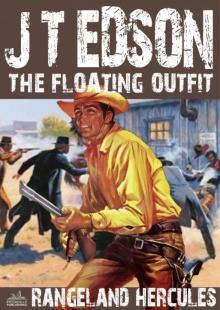 The Floating Outfit 14
The Floating Outfit 14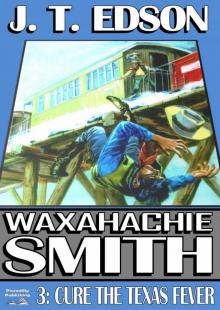 Cure the Texas Fever (A Waxahachie Smith Western--Book 3)
Cure the Texas Fever (A Waxahachie Smith Western--Book 3)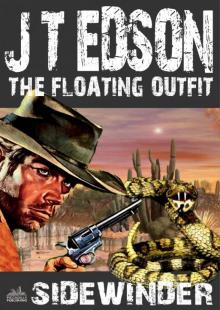 The Floating Outfit 13
The Floating Outfit 13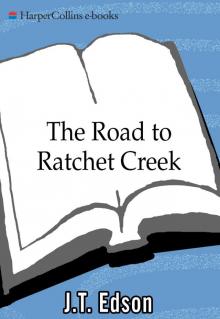 The Road to Ratchet Creek
The Road to Ratchet Creek